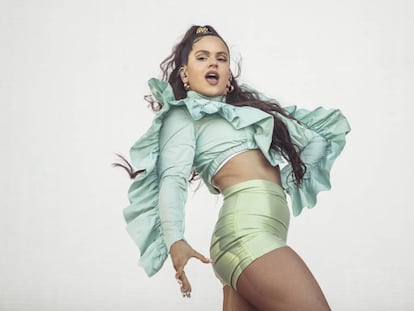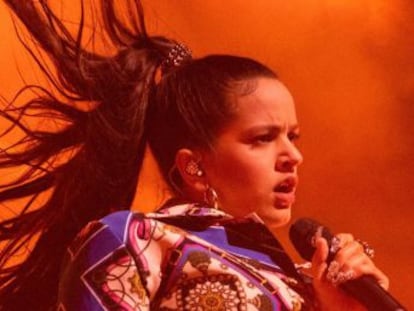From flamenco to Spanglish: Why Rosalía’s latest album is causing a stir
The lyrics to her new song ‘Hentai,’ which have been met with criticism on social media, underscore the Spanish star’s commitment to constant transformation
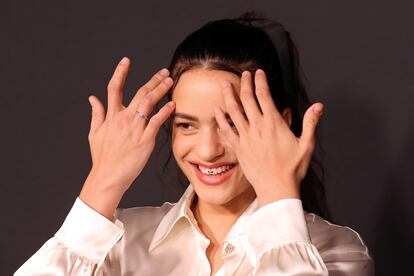
When Spanish singer Rosalía appeared live on Spain’s Cadena SER radio network to present her album El mal querer in November 2018, everyone wanted to see what she had to say. Even the crew of the radio program La Ventana were eagerly awaiting the interview, something that, according to radio presenter Carles Francino, had never happened before, not even with such distinguished guests as Spanish prime ministers, Nobel prize winners or the actor Richard Gere. Rosalía was 25 years old at the time and had two albums to her name. Her responses captivated the interviewers who praised her in hyperbolic terms, comparing the Barcelona-born artist to legendary Spanish copla singer Miguel de Molina. Francino said she had triumphed because she was “very good and very different” – paraphrasing the iconic Spanish poet Jaime Gil de Biedma.
And Francino wasn’t the only one to sing Rosalía’s praises. In a pre-recording, Martín Guerrero, the managing director of Casa Patas, a seminal flamenco venue in Madrid, said that Rosalía was “electrifying, thrilling and unique.” The comments section below the YouTube video of the interview, which has more than 500,000 views, is also filled with messages extolling the singer. “From her vocabulary and her way of thinking, I thought she was a very poised woman, who knows what she is saying when it comes to music and music history and knowledge. She is not your average girl. She is a genius,” one YouTube user wrote.
Francino, perhaps sensing what was about to happen to the pop star, brought the interview to an end with a request: “We are just asking you one thing, Rosalía: don’t change.” He could not have asked anything more difficult of her.
A little over three years later, the public is eagerly awaiting her third album, Motomami, which will be released sometime in 2022. Rosalía has given a preview of what’s to come, sharing snippets of songs such as Candy and Saoko on social media. But the single that has caught the most attention is Hentai, a slow ballad accompanied by piano whose lyrics have triggered bafflement and disbelief. The sexually explicit nature of the song and Rosalía’s use of Spanglish quickly became fodder for internet memes and jokes. In the 20-second clip of the track, Rosalía sings “Te quiero ride como a mi bike” or “I want to ride you like my bike.” The educated and cultured singer, who used to cite centuries-old poetry, sounded like someone completely different.
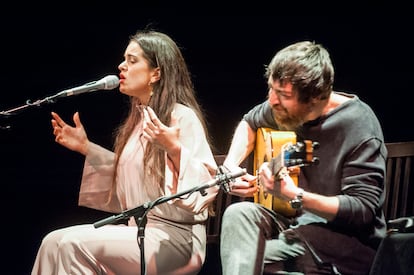
“It’s as if the person who does the songs for [children’s band] CantaJuegos had come home drunk and horny and had opened a notepad,” wrote one Twitter user. “Rosalía is now making music by taking random words from the dictionary,” read another message. The backlash was so great that, a few hours later, Rosalía herself even tweeted about it. “The people who are upset about the lyrics in Hentai, are you okay?”
It has not been a sudden change. Since her debut album Los ángeles, in which the singer made reference to flamenco singers La Niña de los Peines and Enrique Morente, as well as the poet Federico García Lorca, to the explicit and visceral Hentai, five years have passed. In that period, Rosalía has gone from being 24 to 28 years old, and she has experienced a global pandemic that kept her in Miami and away from her family for the first time. She has traveled across Latin America and rubbed elbows with the leading figures of the international music scene. A few months ago, she released a collaboration called Linda with the Dominican rapper Tokischa. The lyrics of the feminist tune – “nos besamos pero somos homies” or “we kiss but we’re homies” – surprised her fans for its simplistic nature. “It’s true that there wasn’t a bad rhyme in her first two albums, her lyrics were excellent. In contrast, in her latest songs there are terrible rhymes,” says Jorge Carrión, the coordinator of the book La Rosalía, ensayos sobre el buen querer (or, Rosalía, essays on ‘el buen querer’).
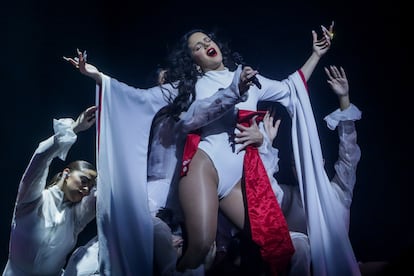
It’s impossible to separate Rosalía’s new music from her travels across the Americas, which she herself has documented in great detail. Like many other stars of today, she has opted to overshare on social media, where she uploads posts on every step she takes without any apparent communication strategy. Her surprising friendship with US personality Kylie Jenner and the rest of the Kardashian family, which appears to be very close, was one of the first shocks. We have seen her surrounded by entrepreneurs such as Dave Grutman and Jonathan Cheban, living an opulent lifestyle (Spain’s far-right Vox party accused her of being a millionaire and having a private plane) and alongside celebrities such as Christina Aguilera, Drake, Naomi Campbell and Hunter Schafer from the US hit series Euphoria.
Living in Miami, Rosalía has started to express herself like other Spanish singers who emigrated to the US before her, such as Julio Iglesias and Alejandro Sanz. The Argentinian newspaper Clarín described her accent as “indecipherable, a mix of Spanish, Catalan, Andalusian and Caribbean, riddled with words in English.” In an interview with a Dominican newspaper, Rosalía explained that her friendship with the Kardashians began when she started to hang out with Kendall in Los Angeles, which she named using the English acronym LA instead of the city’s full name as you do in Spanish.
Rosalía’s constant use of social media clashes with her previous image as an avant-garde artist who had released two albums exploring issues such as grief and gender violence. In her Instagram and TikTok accounts we see a cheerful, exhibitionist and sexual young woman, who often shares photos of herself half-naked and is seen with impossibly long fake nails and heavy makeup. She is obsessed with her pet chihuahua and loves cars and motorbikes – to such a degree that she bought a €60,000 pink-upholstered Ford Ranger Raptor with “La Rosalía” embossed in the headrests. Sometimes she takes on a certain childish attitude as if she were a character of one of the anime series she loves. On TikTok, she shared a photo with the message: “POV: When you steal Raul’s phone and it has FaceID.” The message, written in Spanish and containing spelling mistakes, was difficult to make sense of for those unaware of her relationship with singer Rauw Alejandro, which became public at the end of 2021.
This free-spirited image has left its mark on her music, both in her collaborations and what has been heard of Motomami. Even the name of the album appears to announce a new era that is lighter and fresher. In the video to announce the album launch, Rosalía can be seen covered in red glitter in a jeweled bikini, motorbike helmet and stilettos. The music in the clip is more reminiscent of other contemporary pop artists such as Charli XCX, SOPHIE, Arca or Grimes than of the flamenco which launched her career.
The debate around Rosalía’s transformation is not new. The jump from Los ángeles to El mal querer had already raised questions about whether the move from music that paid homage to traditional flamenco to music that was an explosive mix of genres with global reach was part of a sincere and organic transformation, or whether it hid a premeditated and commercial strategy. Rosalía has behind her a team of women, including her sister Pili, who is the artist’s stylist, her mother Pilar, the administrator of the company Motomami S.L., which manages the financial side of her career, and her manager Rebeca León, who is a superstar herself within the Latin music industry. But Rosalía has always defined herself as a controlling and detail-oriented artist who devises far-reaching projects. She even studied sound engineering in order to have greater control over the creative process. “I’m not doing it for mere strategic reasons, but rather taking into account the reason why I make music: to share it. The priority is to be connected to each moment that I am living and for this to be a means of communication, not a monologue,” she said in an interview with Spanish magazine MondoSonoro in 2018.
Despite his reservations, book coordinator Carrión is still interested in Rosalía’s latest project, which he describes as daring. “I sense that she has both discovered so many new popular genres in Latin America and what it means to be a global artist. She has begun to collaborate with the leading figures in reggaeton, trap and other urban music genres and that has led to a fusion [of styles],” he says. He agrees with Sara García, a comedian and the creator of the stand-up show Riot Comedy, who has been closely following Rosalía, her music and her relationship with Madrid-born singer C. Tangana for years. “She has pulled a ‘Miley Cyrus’ and is making songs that have nothing to do with the aesthetic, rhythms or soul of El mal querer. She is sending us signals that Motomami is not going to have anything to do with what we have seen before.”
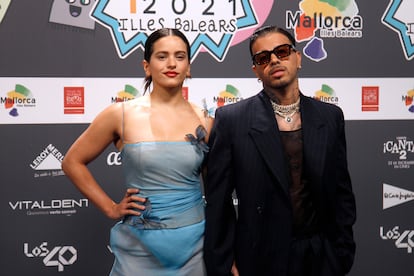
These signs were always there. Rosalía may be multifaceted and unable to be pigeon-holed, but if there is something that defines her it is the way she incorporates everything she knows into her music. Her first album was marked by her studies in flamenco, while the second mixed this knowledge with personal elements such as the R&B music she listened to as a teen and the sound of motorbikes, which her parents have always owned. When she reached success, she wrote Milionària in her native language, Catalan, and now she is writing about the volatility of fame and sexual pleasure with her partner. She also speaks of her own chameleon-like nature in Saoko (”A butterfly, I transform / Drag queen make-up, I transform”).
It’s likely that the reservations about her public image on social media, the people around her and the lyrics of her new songs are no more than a manifestation of prejudices, a generational gap and a certain amount of sexism. We are simply not used to seeing a genius being happy, naïve, sexual and exhibitionist and blowing kisses in photos next to Kylie Jenner. Rosalía’s greatest talent is in breaking the mold.
